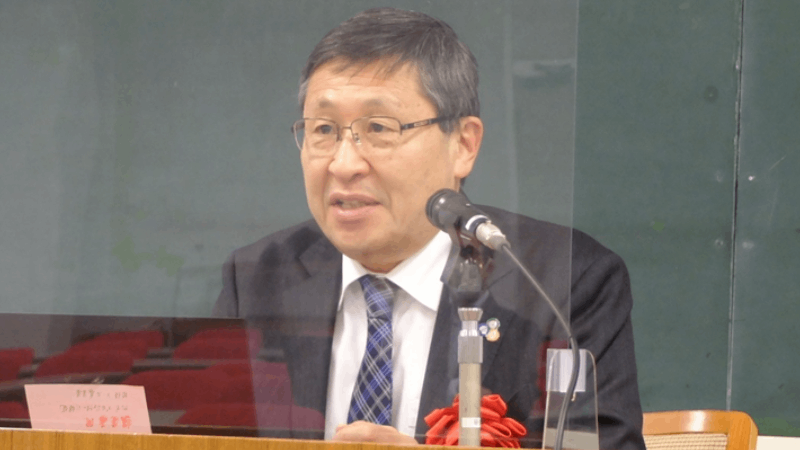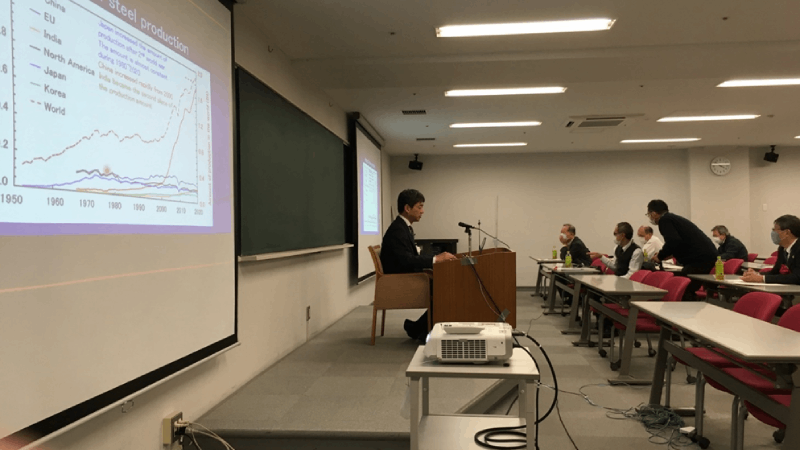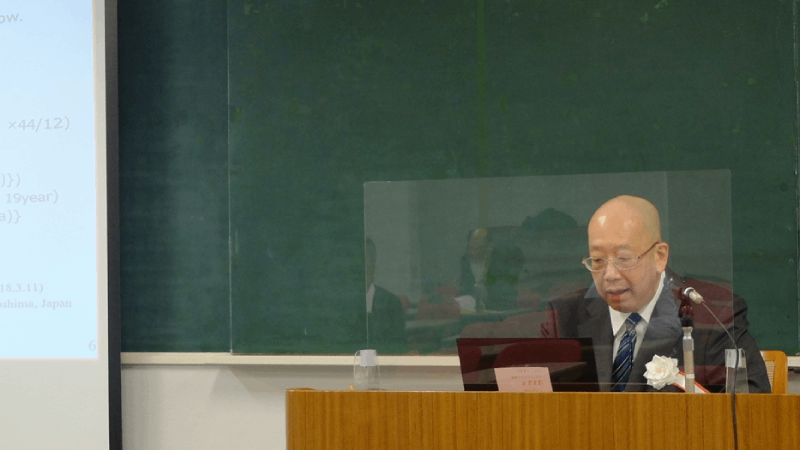After the pandemic-enforced hiatus in 2020, IMechE and the Institution of Professional Engineers Japan held the 3rd of their highly regarded Joint Seminars in Tokyo, which continued the mission of examining critical Climate issues, this time focusing on the two sub-themes of ‘Energy Transformation’ and ‘Fugitive Emissions’ under the overall theme of ‘Net Zero Emissions’.
The Japan Panel of IMechE held the third joint event with the Institution of Professional Engineers Japan (IPEJ). The joint seminar was held in Tokyo on 6 December 2021, on the theme of ‘Net Zero Emissions’, focusing on the sub-themes of ‘Energy Transformation’ and ‘Fugitive Emissions’. Coming on the heels of COP26, the seminar acquired extra momentum, and these themes were given an extra ‘buzz’. The seminar was held in a ‘hybrid’ format of in-person and online participation for both speakers and attendees, and was supported by the Japan Federation of Engineering Societies. The Seminar was in two parts in order to accommodate the time difference between the UK and Japan. It opened in mid-afternoon local time with presenters in Japan and Myanmar, and in the second part moved over to UK speakers.
Through IMechE’s partnership with IPEJ the seminar benefitted from IPEJ’s resources on the ground and their wide network of membership, as well as their enthusiasm and commitment to the partnership. The seminar was also graced by short online appearances from IPEJ’s President, Mr Kazuhiro Terai, and IMechE’s President Mr Peter Flinn, both of whom conveyed their strong support to both the vent and the partnership, and their appreciation of the hard voluntary work of members.
The Opening Remarks of the seminar were given by Dr K Kishimoto, President of the Japan Federation of Engineering Societies (JFES) and a leading figure in academia, professional bodies, and the engineering community at large. Dr Kishimoto, who has been a strong supporter of IMechE’s development in Japan, and in particular its partnership with IPEJ, highlighted the global nature of the challenges facing engineers and the importance of IPEJ working with a strong global body like IMechE to establish a platform for debating and dealing with these challenges.

After the short appearance of IPEJ’s President, the first Keynote presentation was delivered by a recorded video from Mr Taishi Sugiyama, Principal Investigator, The Canon Institute for Global Studies. The presentation was titled “Geopolitical Consequence of Decarbonization and Fossil Fuel in Transition” and, as the title implies, it tackled Energy Transition from the somewhat under-discussed angle of geopolitical implications of the growth in demand for particular minerals such as copper, lithium, nickel ..etc., and the impact of the shift from the current processes of dealing with oil and gas to mining and processing these materials. Much interesting data was included to illustrate the points being made. Mr Sugiyama concluded with two possible scenarios for progress between now and a net zero future.
This was followed by the presentation of Dr Taichi Murakami, Associate Professor, Tohoku University, titled “Ironmaking Technology for Zero-Carbon Steel in Japan”. Dr Murakami started by reminding us of the importance of steel industry and the fact that there are no easy ‘alternatives’, and therefore reducing carbon emissions must be tackled through significant developments in the processes of making steel. Dr Murakami reviewed the history of past developments and the improvements already achieved, and explained that technology to reduce CO2 by 10-30% is already developed in Japan, and that since 2020 NEDO (New Energy and Industrial Technology Development Organization) has been leading the project for zero-carbon steel.

Mr Akihiro Hamasaki, of Mitsubishi Heavy Industries, followed with his presentation “Proposal for the solution of global warming by forestation and carbon pricing”. Mr Hamasaki showed that a serious look at afforestation might make a lot of sense and might be a much more cost-effective route to net zero carbon, especially when coupled with a new equitable system for CO2 pricing.

The last presentation in the first part of the seminar was given online from Myanmar by Mr Tomoo Aoki, Development Consultant (Environment) and General Manager, Myanmar Koei International, titled “Zero Pollution/Emission from Industrial and Municipal Waste”. In it Mr Aoki shows the advantages of the utilization of municipal and industrial waste in Cement Manufacturing as Fuel and Ingredient, as proven by a cement factory in a small city in Japan where the municipal waste of the entire city is used to manufacture cement.
Part two then shifted the action to the UK and opened with a short appearance by Mr Flynn, IMechE President, followed by the second keynote presentation by Dr Tim Fox, immediate Past Chair, IMechE Process Industries Division Board, titled “Fugitive methane abatement for rapid climate change mitigation”. Dr Fox took us on a whirlwind tour on topics such as how potent methane is as a greenhouse gas, the scale of global methane challenge, sources of methane emissions in process industries .. etc., and concluding with a summary of policy and engineering challenges.
This was followed by Mr Martyn Tulloch, Head of Energy Systems, Net Zero Technology Centre, in his presentation “Achieving Net Zero – energy transition opportunities for Japan and the UK”. Mr Tulloch argued that the global journey to net zero will present significant opportunities for entrepreneurial engineers and highlighted areas of common opportunity to both Japan and the UK, with a focus on the offshore energy sector. He showed how a reimagined North Sea, an integrated net zero energy system, can lead this global drive to deliver the commitments of the Paris Agreement.
The last but not least presentation was given by Dr Chris Mann, Chairman and Chief Technology Officer of Bennamann Ltd., titled “A Model for Fugitive Methane Capture and Exploitation from Agricultural Waste on a Global Scale” Dr Mann described how an ‘end to end’ offering of products and services has been developed that is able to capture and commercially exploit the fugitive methane. The end to end offering is enabled by a novel zero venting, low pressure liquid methane storage tank, a novel sealed slurry lagoon with built in storage, and a mobile biogas processing plant. The network is centrally monitored, controlled and optimised via Internet.
The presentations were followed by a short Q&A session, and the closing remarks were given by Mr Ebina, Chair IMechE Japan Panel, and Mr Tsuzuki of IPEJ.